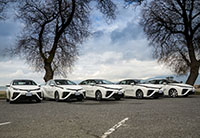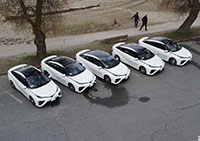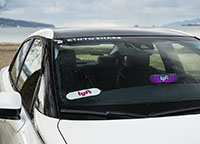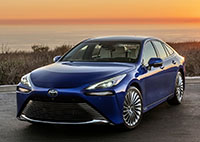
In cooperation with Toyota Credit Canada, Toyota Canada has put together a deal to supply two dozen of its zero-emission Mirai hydrogen fuel-cell cars to ride hailing company Lyft in British Columbia, after which a select group of Lyft drivers will be able to rent these 24 cars through Toyota’s new KINTO Share program.
Eligible Lyft drivers will be able to use the KINTO Share app to rent one of the Mirai cars at $198 per week (plus taxes and fees, inclusive of insurance, scheduled maintenance, and unlimited km), at which point one of three Greater Vancouver Toyota dealerships will facilitate the rental.

“Toyota’s KINTO Share program is proud to partner with Lyft to demonstrate a zero-emission mobility-as-a-service model in another important step toward achieving our global sustainability objectives,” commented Mitchell Foreman, Director of Advanced and Connected Technologies at Toyota Canada. “This proof-of-concept project also allows more Canadians to experience hydrogen fuel cell electric vehicles first-hand, demonstrating their viability and efficiency, especially for fleets.”
While just a trial program, Toyota soon hopes to roll it out across Canada in a larger scale. The program also provides an opportunity for hydrogen fuel-cell awareness.

“Everybody who sits in the back seat [of a Mirai] is going to be able to learn a little bit more about hydrogen technology,” stated Stephen Beatty, Toyota Canada’s Vice President, Corporate. “There’s no way that we could do that on our own.”
The partnership lifts up Lyft’s image as well as Toyota’s, which gains positives for adding to its zero-emissions fleet.

“Lyft’s mission is to improve peoples’ lives with the world’s best transportation, and to achieve this, we need to make transportation more sustainable,” added Peter Lukomskyj, General Manager, Lyft in B.C. “This partnership will better serve current drivers and those who don’t have a vehicle, but want to drive with Lyft for supplemental income, while moving us toward our goal of reaching 100-percent electric vehicles on the platform by 2030.”

The Mirai, which comes standard with a 151-horsepower electric motor good for 247 pound-feet of torque, was the first mass produced hydrogen fuel-cell-powered EV in the world when Toyota launched six years ago. Instead of conventional plug-in electric vehicles that might requires days to completely recharge when hooked up to a regular 12-volt household-style power outlet, or at the minimum hours when using a fast-charger, the Mirai can be totally refuelled in approximately five minutes via specially outfitted hydrogen stations, which are now located in key locations around the Vancouver lower mainland.
The Mirai can be driven up to 500 kilometres between fills, and all the while only emits water from its tailpipe. Additionally, its zero-emission status makes it eligible for BC’s high-occupancy vehicle (HOV) lanes, resulting in quicker commutes during peak rush hours. This can be critical for the profitability of a ride hailing driver.
Story credits: Trevor Hofmann
Photo credits: Toyota
